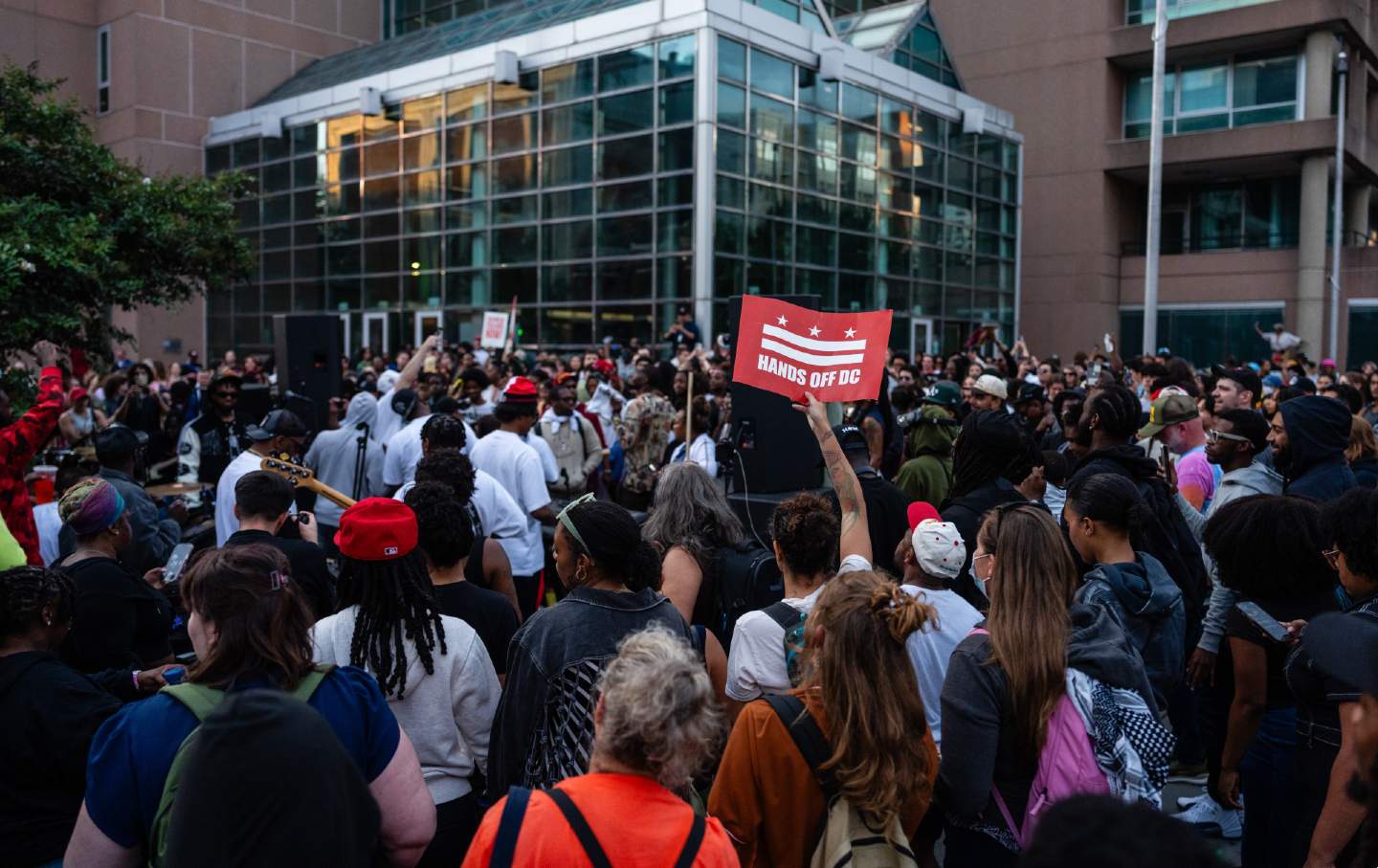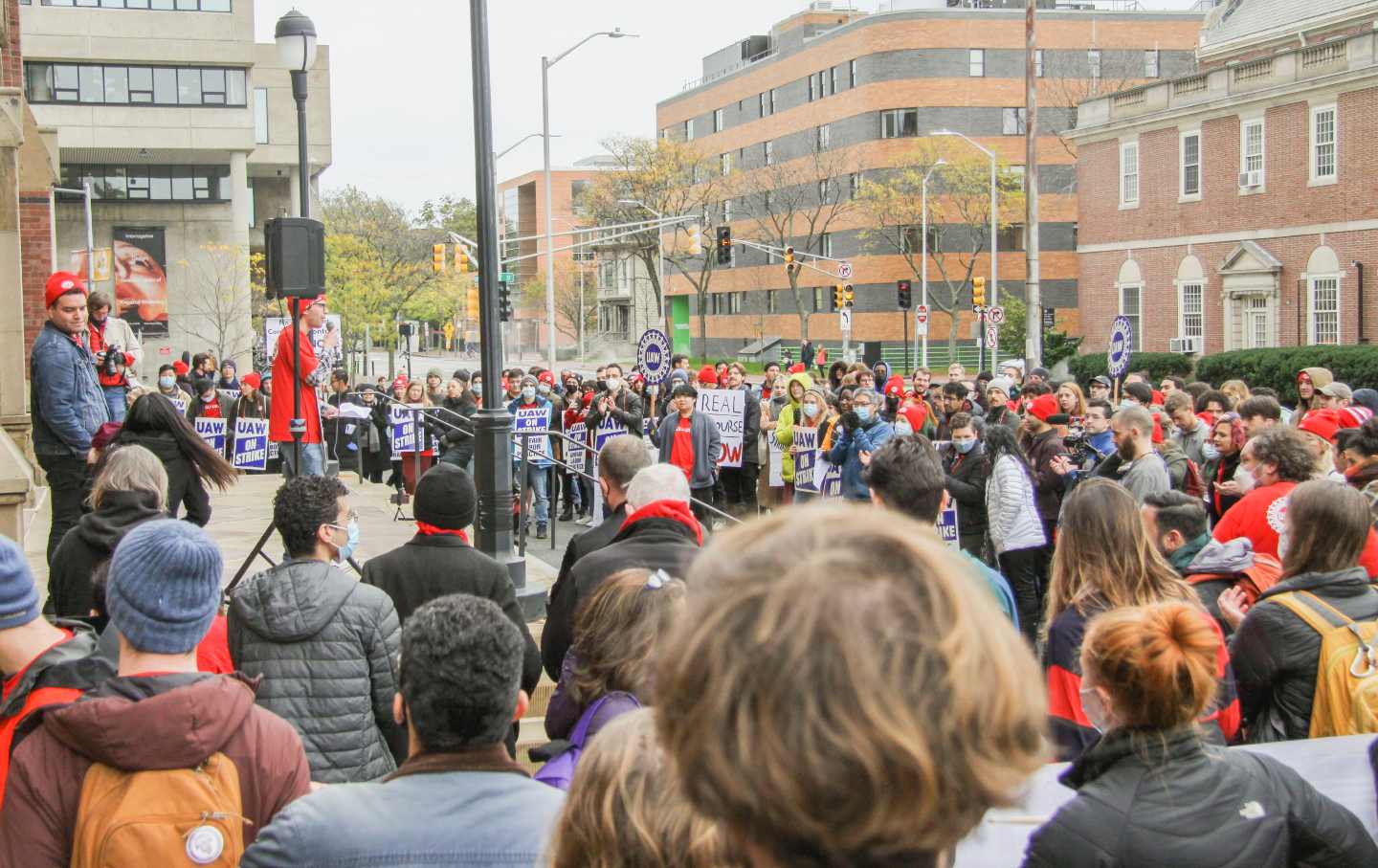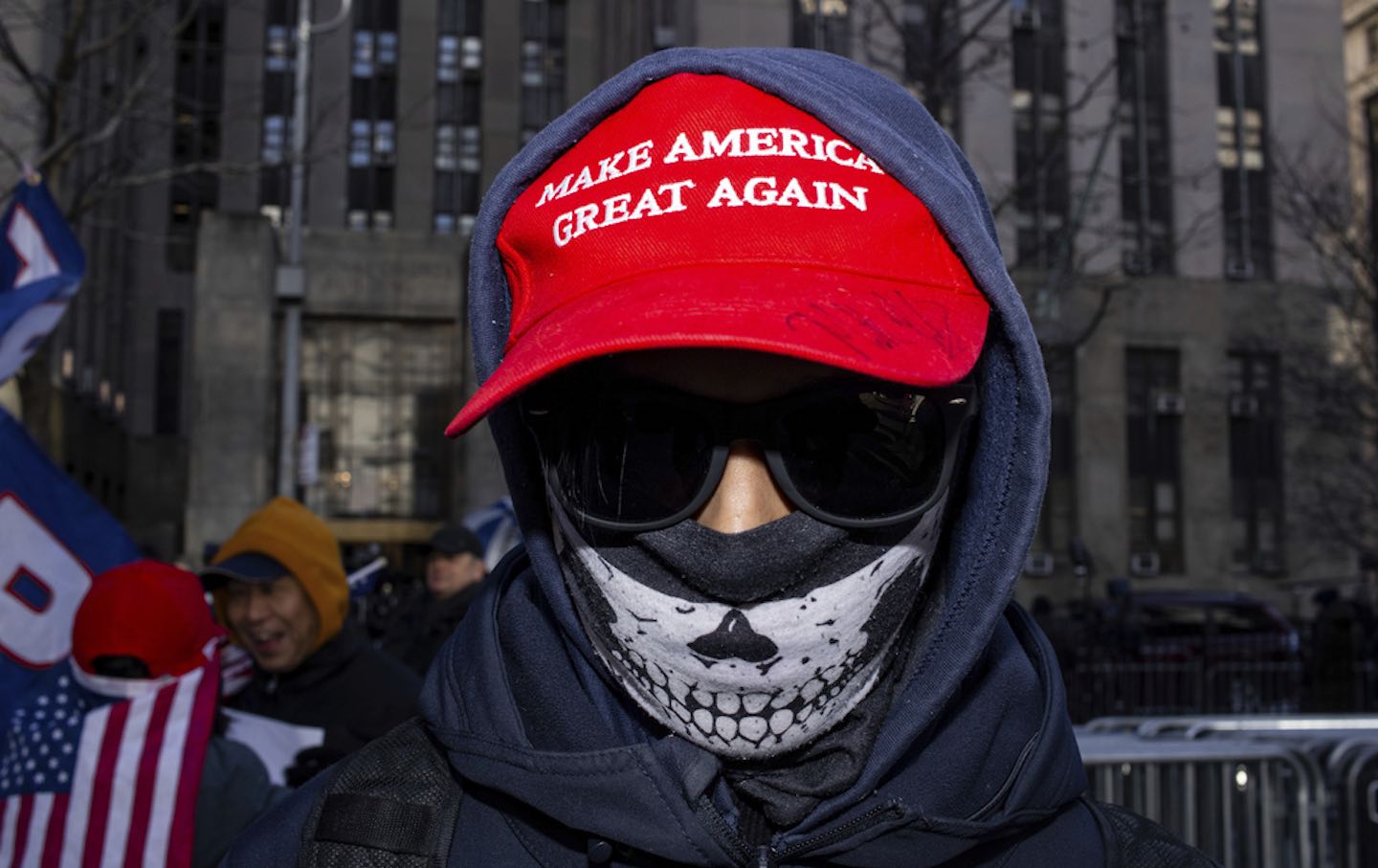My Grandmother Stood Up to Nixon—Jeff Bezos Should Take Note
Fifty-four years ago, Katharine Graham defended The Washington Post against presidential threats. Her granddaughter now fears its soul is being sold.

Fifty-four years ago, in 1971, my grandmother Katharine Graham, publisher of The Washington Post, risked everything to stand up to a corrupt president. That president sought to destroy her newspaper’s autonomy. Today, faced with another such president, Jeff Bezos, the paper’s new owner, is tearing down the very newspaper she defended.
My grandmother was the woman who staved off threats from President Richard Nixon, defied her lawyers and her board, and said yes to publishing the Pentagon Papers, which revealed that the government was lying to the public about the Vietnam War. She was the woman who published leaks about Nixon’s involvement in Watergate. The woman who found her voice in the very act of using it. Very often she was, as the new documentary Becoming Katharine Graham makes clear, the only woman in the room—still, she didn’t flinch.
A few months ago, I flew to Washington, DC, to bring one of my sons to meet his great grandmother, on screen, in the documentary by filmmakers George, Peter, and Teddy Kunhardt.
Kay, as her friends called her, died in 2001 before my children were born. Suddenly voting age, I wanted to be sure my son understood the weight of this new responsibility and what our country risks losing if we lose our First Amendment rights.
The documentary cracked something open in me. For years, I’ve hidden the fact that I had a famous grandmother. Kay wasn’t the grandmother I longed for—not like the cookie-baking grandmothers on TV. Visits to her mansion were daunting. There were grand parties, battalions of servants and political banter—but little warmth. Despite efforts, she could be intimidating and judgmental.
I’d grown up with the movie All the President’s Men, which gave all the credit to the men (famed reporters Woodward and Bernstein), erasing Kay’s role entirely. The movie The Post reinserted her in history—but offered a Disney-esque version. This film makes her three-dimensional. I saw her wounds. I saw her fear. I saw her courage.
When editor Ben Bradlee brought her the Pentagon Papers, Kay had every reason to say no. She’d been told by her overpowering mother that her voice was irrelevant. Her lawyers warned her. Her board cautioned her. Nixon’s henchmen threatened to pull her TV broadcasting licenses. Instead, as she wrote in her memoir, she “took a big gulp and said, ‘Go ahead.… Let’s go. Let’s publish!’”
She chose the truth. She empowered her journalists. This helped end a war. It changed history.
Today, I’m coming out of the shadows because The Washington Post is under threat again, this time from Bezos.
I do not speak for my family; my opinions are mine alone. I’ve never had the honor to be part of the newsroom or the company: I chose to forge a different path.
In 2013, my family made the gut-wrenching decision to sell the Post to Bezos, the Amazon founder. The paper was losing revenue because advertisers were moving online. My uncle Don Graham and my sister Katharine Weymouth, both former publishers, believed Bezos had the technological and financial capacity to usher the newspaper into the digital age. Bezos promised, “The values of the Post do not need changing…. We will continue to follow the truth wherever it leads.”
For the first Trump term, Bezos honored that promise. He even added the phrase “Democracy Dies in Darkness” to the masthead. My family trusted him.
Now, in the face of a more tyrannical Trump, Bezos has retreated. He’s muzzled his editorial page. Exceptional writers, editors, cartoonists have fled. Eight days before the election, the Post canceled a scheduled endorsement of Kamala Harris—breaking with decades of precedent. Four hundred Post journalists signed a protest letter. Two hundred and fifty thousand readers canceled their subscriptions.
On the same day the Post spiked its endorsement, executives from Bezos’ aerospace company, Blue Origin, met with Trump. Coincidence?
On April 4, Blue Origin was awarded a government contract for $2.4 billion to launch the Pentagon’s satellites into space. Bezos further broke journalistic ethics by donating $1 million to Trump’s inauguration and buying the rights to Melania Trump’s docuseries for $40 million.
The Post’s Code of Ethics requires its journalists “to avoid conflicts of interest.… We pay our own way. We accept no gifts.… We must be wary of entanglement with those whose positions render them likely to be subjects of journalistic interest.”
Cartoonist Anne Telnaes called him out in a cartoon depicting Bezos, alongside other tech billionaires, kneeling to Trump—offering money bags. Her cartoon was killed. She quit. She went on to win a second Pulitzer Prize, in recognition of “piercing commentary on powerful people and institutions.”
The unraveling continued in March, when Bezos announced on X that Opinion page writers must embrace the pillars of “personal liberties and free markets”—opposing viewpoints were not welcome. Editor David Shipley and more journalists quit. Seventy-five thousand more subscribers canceled. How, I ask, does silencing the voices of your writers support “personal liberties”?
Ruth Marcus, an award-winning 40-year-veteran journalist resigned, writing, “At a moment when the Post should have been stepping forward to sound the clarion call about the multiple dangers that Donald Trump poses to the nation and the world, it has chosen to step back.”
Bezos caved again, in April, this time at Amazon, in response to Trump’s fury over Amazon’s plan to display the impact of tariff increases on prices. Trump phoned Bezos. The tariff reveal was scrapped. Trump gloated, “He solved the problem very quickly.”
In an eloquent column, prior to resigning, Eugene Robinson wrote of my grandmother, “She bowed to no president. I bow to her.”
I grieve for these writers, who must choose between feeding their families and honoring their integrity. I bow to them.
Now Bezos has selected a new Opinion editor, Adam O’Neal, who cheerily introduced himself on X. He echoed his new boss’s orders, stating Opinion-page writers must be “stalwart advocates of free markets and personal liberties.” Bizarrely, he added that all future opinion articles will be “unapologetically patriotic.”
Real American patriotism does not force journalists to deliver government propaganda. My grandmother was a real patriot; she protected the rights of her journalists to deliver the facts and speak their minds—without fear of censorship.
Popular
“swipe left below to view more authors”Swipe →O’Neal also suggested that they’ll incorporate news from “other outlets” and “even nonprofessional writers.” Is this the death of fact-based journalism? Will there be cat videos too?
For Bezos, the Post might be just another plaything; for my family, it was a civic trust. My great-grandfather Eugene Meyer bought The Washington Post at a bankruptcy sale in 1933. My grandfather Phil Graham expanded it, until his tragic death. Kay took over when no one believed she was capable; she made it a paper worth believing in.
No one doubts that it is hard to stand up to Trump. His threats, and the violence he stokes, are terrifying—striking fear into the hearts of immigrants, citizens, judges, and our own lawmakers.
Kay never spoke about her struggles. Yet, in the documentary, her voice broke as she recalled my grandfather Phil’s battle with bipolar illness, his suicide. I understood then that beneath her steely veneer had lived a terrified woman, thrust into running a company, while raising four children, who had just lost their father. She overcame crippling self-doubt, sexism, and a bullying president. She had no therapy, no training—a million reasons to cave.
Kay once described herself as a “doormat housewife.” Yet she became the most powerful publisher in America. Despite great wealth and power, she and my family taught me that with privilege comes a duty: to treat others with dignity and to make this world a better place.
As I sat beside my son, in the darkened theater, I forgave her personal limitations. I grasped how fierce she’d been. That bravery is a legacy I am proud to pass on.
So, this is me, speaking up. Like my grandmother, I dread confrontation. “I really hate fights,” she once said. “But when cornered, then I can fight.”
We are all cornered now. I too have considered canceling my Post subscription, but I haven’t yet. I see the journalists who continue to expose hard-hitting facts about the inhumane, unconstitutional actions of this administration.
If the free press can be manipulated by politicians, if truth is viewed as optional, if The Washington Post goes dark under Bezos, then we lose more than a legend. We lose the very thing that makes America a democracy.
Bezos had a choice. He could have reversed course. Honored the promise he made to protect this American institution. My grandmother faced down an immoral president. Bezos has chosen to go down as the man who destroyed The Washington Post—and dismantled its soul.
Take a stand against Trump and support The Nation!
In this moment of crisis, we need a unified, progressive opposition to Donald Trump.
We’re starting to see one take shape in the streets and at ballot boxes across the country: from New York City mayoral candidate Zohran Mamdani’s campaign focused on affordability, to communities protecting their neighbors from ICE, to the senators opposing arms shipments to Israel.
The Democratic Party has an urgent choice to make: Will it embrace a politics that is principled and popular, or will it continue to insist on losing elections with the out-of-touch elites and consultants that got us here?
At The Nation, we know which side we’re on. Every day, we make the case for a more democratic and equal world by championing progressive leaders, lifting up movements fighting for justice, and exposing the oligarchs and corporations profiting at the expense of us all. Our independent journalism informs and empowers progressives across the country and helps bring this politics to new readers ready to join the fight.
We need your help to continue this work. Will you donate to support The Nation’s independent journalism? Every contribution goes to our award-winning reporting, analysis, and commentary.
Thank you for helping us take on Trump and build the just society we know is possible.
Sincerely,
Bhaskar Sunkara
President, The Nation
More from The Nation

Letter From DC: Goodbye to John Wall, Hello to Celebrating His Rebel Spirit Letter From DC: Goodbye to John Wall, Hello to Celebrating His Rebel Spirit
The former Washington Wizards point guard retires from the NBA, but the anti-Trump protests embody his swaggy defiance.

A Losing “Argument” A Losing “Argument”
The buzzy new publication devoted to “libbing out” reprises the mistakes of the longstanding alliance between neoliberalism and Beltway journalism.

Trump’s War on Higher Ed Comes to the Bargaining Table Trump’s War on Higher Ed Comes to the Bargaining Table
As two of the nation’s largest private graduate student unions fight for new contracts, their members have been among the most vulnerable to the president’s attacks on universitie...

I Went to the “Free Press” Party for Under-30s. All I Got Was Ennui. I Went to the “Free Press” Party for Under-30s. All I Got Was Ennui.
At Bari Weiss’s “Cheers to the Republic” mixer, I met anti-vaxxers, was recruited for a trip to Israel, and heard the word “heterodox” more than I would have liked to.

MAGA Conservatives Are Terrified of the Future MAGA Conservatives Are Terrified of the Future
Trump and his followers don’t just want to halt progress. They want to turn back the clock.

As Federal Support Wanes, States Must Reinvest in Higher Education As Federal Support Wanes, States Must Reinvest in Higher Education
Our education system faces a crisis of affordability and access only amplified by the passage of the Big, Beautiful Bill and Trump’s attempted cuts. States need to step up.


